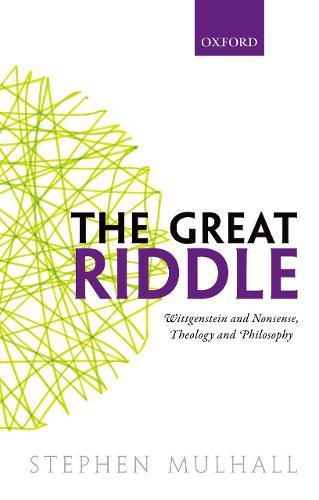Overview
Can we talk meaningfully about God? The theological movement known as Grammatical Thomism affirms that religious language is nonsensical, because the reality of God is beyond our capacity for expression. Stephen Mulhall critically evaluates the claims of this movement (as exemplified in the work of Herbert McCabe and David Burrell) to be a legitimate inheritor of Wittgenstein's philosophical methods as well as Aquinas's theological project. The major obstacle to this claim is that Grammatical Thomism makes the nonsensicality of religious language when applied to God a touchstone of Thomist insight, whereas 'nonsense' is standardly taken to be solely a term of criticism in Wittgenstein's work. Mulhall argues that, if Wittgenstein is read in the terms provided by the work of Cora Diamond and Stanley Cavell, then a place can be found in both his early work and his later writings for a more positive role to be assigned to nonsensical utterances--one which depends on exploiting an analogy between religious language and riddles. And once this alignment between Wittgenstein and Aquinas is established, it also allows us to see various ways in which his later work has a perfectionist dimension--in that it overlaps with the concerns of moral perfectionism, and in that it attributes great philosophical significance to what theology and philosophy have traditionally called 'perfections' and 'transcendentals', particularly concepts such as Being, Truth, and Unity or Oneness. This results in a radical reconception of the role of analogous usage in language, and so in the relation between philosophy and theology.
Full Product Details
Author: Stephen Mulhall (New College, Oxford)
Publisher: Oxford University Press
Imprint: Oxford University Press
Dimensions:
Width: 13.80cm
, Height: 1.20cm
, Length: 21.60cm
Weight: 0.180kg
ISBN: 9780198801627
ISBN 10: 0198801629
Pages: 148
Publication Date: 22 March 2018
Audience:
College/higher education
,
Professional and scholarly
,
Tertiary & Higher Education
,
Professional & Vocational
Format: Paperback
Publisher's Status: Active
Availability: To order

Stock availability from the supplier is unknown. We will order it for you and ship this item to you once it is received by us.
Reviews
Stephen Mulhall's recent book derived from his 2014 Stanton Lectures is a well written, carefully argued and sophisticated contribution which centrally rests upon a resolute reading of the early Wittgenstein. His project is to take the resolute reading combined with several other additional ways of reading Wittgenstein, such as Malcolm on analogy, to bring out hitherto unnoticed aspects of his work and offer a properly philosophically grounded articulation of grammatical Thomism. As the chapters progress there are steadily increasing layers of sophisticated Wittgenstein interpretation, such as that involving analogy, which build upon each other to claim that his later work has a perfectionist dimension which relates to the concerns of moral perfectionism and 'perfection' and 'transcendentals'. * Mark Addis, Notre Dame Philosophical Reviews *
Author Information
Stephen Mulhall is Professor of Philosophy and Fellow of New College, Oxford. He was previously a Prize Fellow at All Souls College, Oxford and a Reader in Philosophy at the University of Essex.




